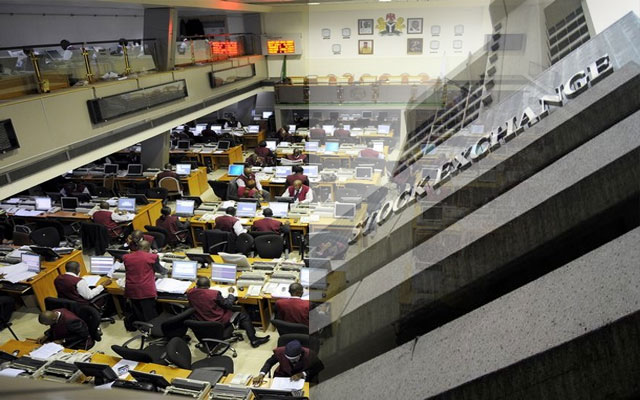Nigeria’s Stock Market Plumps as Investors Lose N2.8trn
Bearish sentiment was sustained on the Nigerian Exchange Limited over the past week, leading to the market closing in the red, with investors losing N2.84tn, a 2.90 per cent decline in market capitalisation.
The All-Share Index also declined by 2.99 per cent week-on-week to close at 149,524.81 points. Consequently, the year-to-date gains slipped to 45.3 per cent from 49.7 per cent in the previous week.
Trading activities were impacted by the threat of military action against Nigeria from the President of the United States, Donald Trump, profit-taking activities and portfolio rebalancing, which saw the market close in the red throughout the past week. The week started with profit-taking in the shares of Aradel, AccessCorp and Dangote Sugar, which continued into the next trading session.
By Wednesday, selling interests had shifted to the stocks of Transcorp, MTN Nigeria and Lafarge. Banking stocks also came under pressure as investors dumped Ecobank Transnational Incorporated, Access Bank and Zenith Bank shares. By Friday, there was some buying interest in a few stocks, but the market remained bearish.
In terms of volume, total turnover was 3.575bn shares worth N107.01bn exchanged in 146,429 deals, compared to 7.479bn shares valued at N145.43bn that changed hands the previous week in 159,487 deals. The top traded stocks by volume were FCMB (315.3m units), Aso Savings (272.2m units), and United Bank for Africa (216.0m units), while the top traded stocks by value were Zenith Bank (N11.5bn), Guaranty Trust Holding Company (N9.7bn), and UBA (N8.7bn).
Across sectors, performance was negative. Leading the laggards was the Insurance Index, which slumped by 7.6 per cent, driven by sell-offs in Sovereign Trust Insurance (-28.2 per cent) and Cornerstone Insurance (-10.2 per cent). Similarly, the Oil & Gas and Banking indices shed 4.8 per cent and 3.9 per cent, respectively, on the back of sell pressure on Oando (-16.8 per cent), Aradel (-8.2 per cent), AccessCorp (-10.0 per cent) and ETI (-8.9 per cent). The Consumer and Industrial Goods indices retreated by 2.5 per cent and 1.1 per cent, following price declines in Nestlé (-9.7 per cent), Dangote Sugar (-8.1 per cent), Lafarge (-6.4 per cent), and Beta Glass (-10.0 per cent).
Market breadth remained heavily skewed to the bears, closing at 0.27x with 20 gainers against 75 losers, a clear indication of widespread sell pressure across sectors.
On the gainers’ side were NCR (+20.9 per cent), Eunisell (+20.2 per cent), Union Dicon (+9.9 per cent), Honeywell Flour (+9.5 per cent), and UPDC (+6.8 per cent), who emerged as top performers on renewed buying interest and improved liquidity positions. On the other hand, Sovereign Trust Insurance (-28.2 per cent), C&I Leasing (-20.2 per cent), SKY AVN (-19.0 per cent), Berger (-17.4 per cent), and International Energy Insurance (-17.0 per cent) suffered steep losses, reflecting sustained sell pressure and weak sentiment among retail and institutional investors alike.
In the week ahead, analysts have maintained that the market is expected to remain cautious and react based on the macroeconomic data to be published this week.
“The market is likely to remain cautious as investors continue profit-taking and reallocate capital in line with fiscal year considerations. Although near-term volatility may persist, the impressive YTD gains suggest that underlying fundamentals remain relatively strong. Market direction in the coming weeks will likely be influenced by macroeconomic indicators, particularly inflation, exchange rate stability, corporate earnings updates, and liquidity flow from both local and foreign investors.
“However, investors are expected to maintain a selective approach, tilting towards fundamentally sound and defensive stocks capable of weathering short-term market swings,” said Cowry Asset Management in its weekly report.
Afrinvest projected that in the coming week, market dynamics will remain bearish, driven by weak investor sentiment across major bellwethers.
Nigeria had shrugged off Trump’s threat to issue a $2.35bn Eurobond on the international capital market, which was oversubscribed. The dual-tranche issuance, comprising $1.25bn (10-year) and $1.10bn (20-year) maturities, was priced at 8.6308 per cent and 9.1297 per cent yields, respectively.
Earlier in October, the National Assembly approved President Tinubu’s request to tap the external debt market for up to $2.35bn, primarily to finance the 2025 budget and shore up dollar liquidity ahead of the $1.18bn Eurobond maturity due in late November.
The Debt Management Office, in the wake of the offer, said that the transaction attracted a peak order book of over $13bn, marking the largest ever order book achieved by the Republic.
“This significant milestone underscores the strong support for the transaction across geography and investor class. With respect to investor class, demand came from a combination of fund managers, insurance and pension funds, hedge funds, banks and other financial institutions,” said the DMO.
The Director-General of the Debt Management Office, Patience Oniha, added, “Nigeria’s ability to access the Eurobond market to raise long-term funding needed to support the growth agenda of President Bola Tinubu is a major achievement for Nigeria and is consistent with the DMO’s objectives of supporting development and diversifying funding sources.”
The Eurobond will be admitted to the official list of the UK Listing Authority and will be available to trade on the London Stock Exchange’s regulated market, the FMDQ Securities Exchange Limited, and the Nigerian Exchange Limited.
For the transaction, the DMO said Chapel Hill Denham, Citigroup, Goldman Sachs, J.P. Morgan and Standard Chartered Bank acted as joint bookrunners, while FSDH Merchant Bank Limited acted as financial adviser on the issuance.

